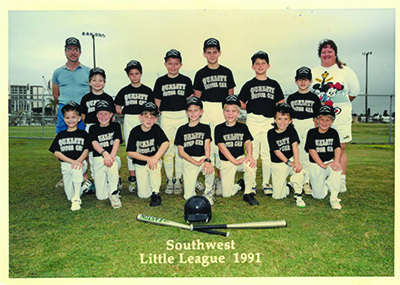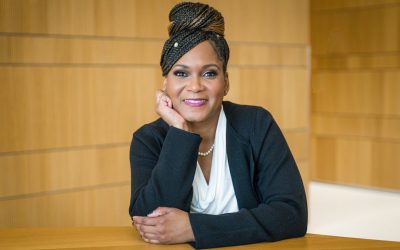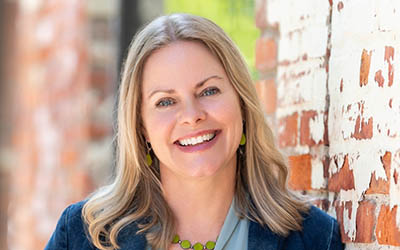A lifelong quest to ensure everyone’s right to a good time
By Derek Herscovici ’14
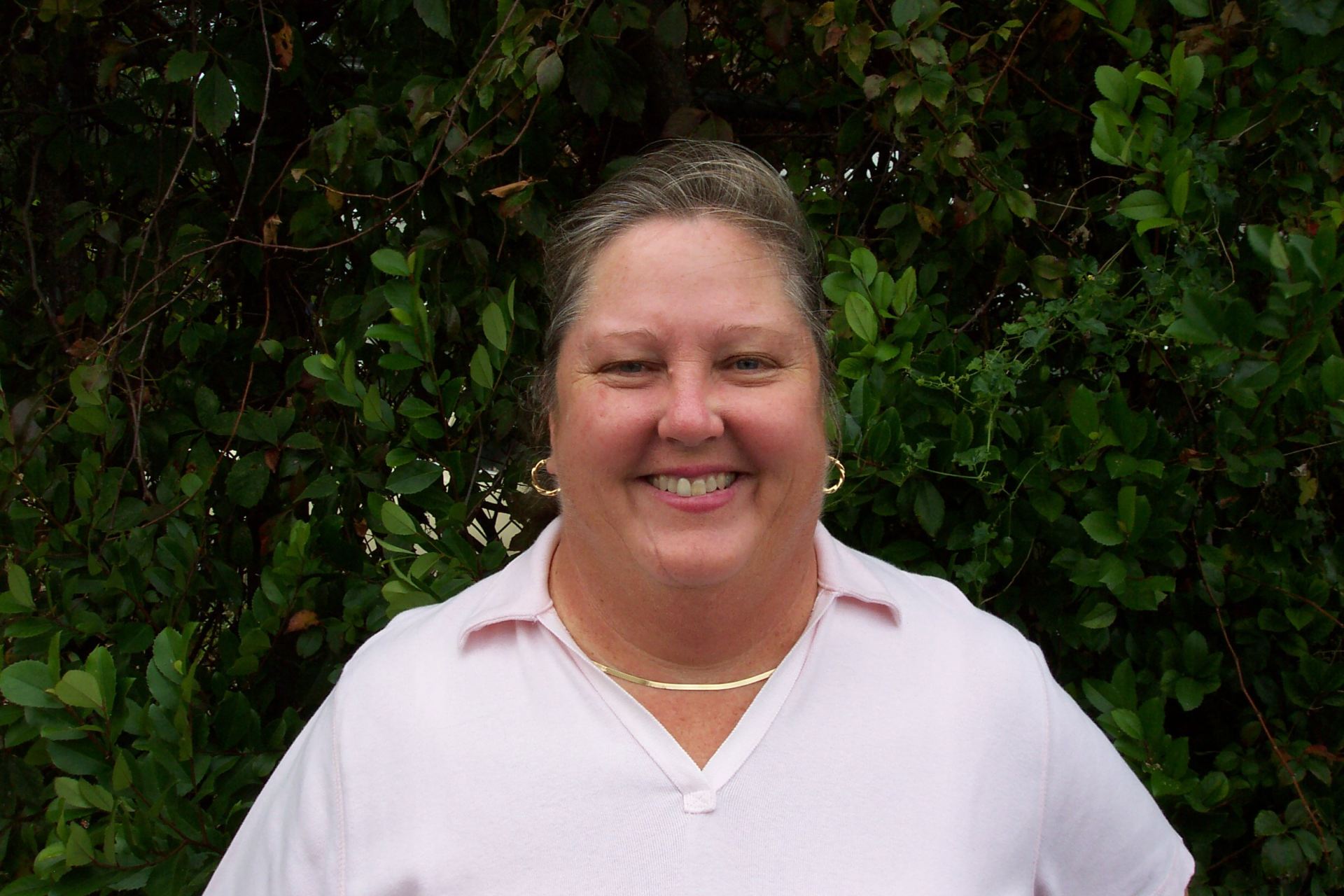
Strolling on any of Pinellas County, Florida’s parks, beaches or sports facilities, it can be easy to assume they are always ready for action. But away from the public eye, hundreds of officials and staff members work throughout the year to keep them in pristine condition, no matter the season. Without them, the city’s most critical public works would fall into disrepair and its recreational activities left without a home.
Still, Leah Hoffman ’75 isn’t looking for recognition or fame. The former president of the Florida Recreation and Parks Association, Hoffman’s career of keeping her home state pristine and ready for play spans more than 40 years. From growing turf and building playgrounds to scheduling soccer tournaments, Hoffman learned to balance ecosystem and economy in a state that knows no ‘off’ season. It’s more than being “a ‘jock’ who knows how to mow a lawn.”
“You can’t keep playing on a field and expect it to stay in good shape if you don’t maintain it,” says Hoffman. “As the years have gone on, the parks and recreation has taken on a lot of different roles, from just doing summer camps to where they’re doing huge special events and sports tournaments. They have to maintain good ecological and environmental sensitivity in their park system [and] in their natural resource areas.”
These days, Hoffman is semiretired and living in Seminole, Fla., just up the beach from her hometown Pass-a-Grille. Though the Pinellas County today is known for its number of parks and beaches, in the ‘60s much of it was still small coastal fishing communities and retirement homes. When it came time to look for colleges, the Hoffman family toured the requisite state schools, but also visited Auburn. One of the things that immediately endeared the school to her was the football team. “My high school didn’t really know what football was,” Hoffman laughs.
After earning her degree in education, she was dead set on becoming a teacher, but after a year in the classrooms of Pasco County schools and St. Petersburg Junior College (now St. Pete College), she was already looking to do something else.
That’s when she saw the job opening for a full-time recreation supervisor. After the parks’ staff was joined with the recreation staff, the position began to grow on her. It also gave her a greater appreciation for the combined work the department as a whole.
“We can’t look at us as either the “park” people or the “recreation” people; we have to look at it as a unit, as one. We have to work together in order to make the system better.”
Hoffman had worked for the city of St. Pete Beach as a “recreation leader” during her summers home from Auburn, helping chaperone kids to nearby Busch Gardens and Sunken Gardens or to the newly opened Disneyworld in Orlando. On other days, they would play games like floor hockey in the gym or tennis outside. Anything to keep the kids busy until their parents picked them up at 5 p.m. What she never expected was the impact she left on the students.
“I can’t say I regret getting out of education because, in a way, I really didn’t,” says Hoffman. “The money was never great, but I get a lot more reward when I’m able to see that I’ve done some good for some kids that may have been on the cusp of the wrong side of the tracks, and they made good on that.” In 1980, Hoffman was named assistant director and parks superintendent of St. Pete Beach, a position she held until 1996. Working for the Parks & Recreation was easier back then, she says. City programs weren’t expected — or pressured — to recoup their monies and taxpayers footed most of the bills.
But still, she often was at city council meetings, advocating for the department or defending budget items from commissioners who cared more about the bottom line than the benefits.
Especially in the 1980s and 90s, Hoffman worked long and hard to fight budget cuts while ensuring that her department had the staff and resources to accomplish the mission.
“Not one of my favorite things to do, but that’s part of the job,” she says. “Particularly if [city council members] had questions to ask you about an event or a certain project or your budget, you need to be able to give ‘em the facts right up front.”
Even with a dwindling budget, Hoffman and her team were able to accomplish a lot. Among their public improvement projects were new lights and irrigation systems at ballfields and transforming the city’s “sandlots full of sandspurs” into functional recreation areas. She helped initiate St. Pete’s first “Dune Project,” which helped protect beaches against erosion and flooding. Even Hurley Park in Pass-a-Grille got a makeover that included a basketball court, playground, improved baseball field and bathrooms — something the beachfront property desperately needed.
Hoffman was recruited as city operations manager for the city of Tampa in 1996. It was similar work, but on a completely different scale.
Only a few minutes across the bridge, Tampa had a population of at least half a million compared to the 10,000 living in St. Petersburg. From her headquarters at the Tampa Zoo (present-day Lowery Park), she was responsible for keeping the city’s southern quarter beautiful — a job easier said than done.
“I’m not one that just sits back and watches my guys,” says Hoffman. “I would actually get out there and the guys out there never had that before. I said, ‘well, why can’t I push a shovel or a broom too?’”
When one of Hoffman’s coworkers from the City of Tampa became a city director of Wichita, Kansas, he took her with him. Among the learning curves she had to pick up was preparing for the weather: snow days and tornadoes — not hurricanes — constituted Wichita’s biggest natural emergencies.
Managing the city’s diverse recreational programs was also a huge priority. In addition to massive soccer tournaments and adult softball leagues, she oversaw inter-city football leagues, after-school tutoring, arts and crafts, public basketball courts and more. In one instance, rather than tear it down, Hoffman’s team transformed a public swimming pool dating to the early 1900s into a splash park for kids. When the events of 9/11 hit Wichita’s airline industry-driven economy, Hoffman found a position opened as an operations manager with the Pinellas County Parks & Rec department. More budget cuts took her from Pinellas to a seat on the Marion County, Fla. Board of County Commissioners.
“[The] Lord was looking out for me,” Hoffman says. “When a door closes, a window opens somewhere.”
In 2011, after beginning at the ground-level, Hoffman was elected president of the Florida Parks and Recreation Association; she went to work immediately. Central to the success and longevity of the FRPA, Hoffman says, is demonstrating the value that parks and recreation have as a resource for the community.
One of the first things she did as president was rebrand the association with a new logo centered around the theme “It Starts in Parks,” a motto that is still used to this day.
“If you think about it, growing up everybody likes to go to the park: you might learn to swing your first bat there or get on your first swing or first slide. Recreation is not just throwing a ball out and letting kids play; you have to be able to mold them in learning new activities that, potentially, could be a lifelong event for them,” says Hoffman. “Sometimes, kids don’t know what to do unless they’re pointed in the right direction and have the right assistance. So, you have to be a professional when you’re in this profession; just because you can throw a ball or slap a hockey puck, that’s not all that it takes. You have to be a mentor.”
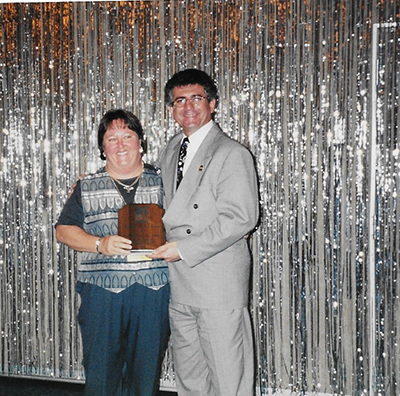
In 2019 Hoffman received the Florida Recreation and Parks Association’s Lifetime Achievement Award amidst family and a multitude of friends. Despite all the positions in all the departments she’s held over the years, she still says she was “stunned” to find out. The trophy is still on her coffee table.
“I worked hard because that’s something that I believed in, it’s just something I did. You go there and do what’s best for your profession,” she says. I was very honored that my peers felt that I deserved this award.”
Hoffman uses the phrase “official retirement,” because while she is no longer a full-time employee, she’s still involved with conferences, local and regional meetings and more, dispensing advice and helping register new members.
She is heartened to see her personal motto “keep doing, keep giving” being taken up by more people, especially younger generations.
Recently, she’s encountered former pupils enrolling their own children into city programs. Some even have jobs with the city now and continue the work she did.
“Police and fire are essential, but so is parks and recreation,” says Hoffman. “What happens if people don’t have a place to go to exercise or take out their frustrations in a good way by doing some hoops, hitting some balls or going to a golf course? It is important.”
Auburn Alum and NBC Entertainment Correspondent, Chloe Melas, is Making News
A meeting at Auburn’s student-run television station launched Chloe Melas’ career as an entertainment news correspondent for VH1, CNN and NBC news.
The Teacher’s Coach
She wanted to be a physical therapist, but now Joy Gaston Gayles ’98 helps support and inspire a new generation of professors.
Alumna Furnishes Homes for Homeless
A former nurse helps Michigan’s homeless create a new beginning, one piece of furniture at a time.
Auburn Alum and NBC Entertainment Correspondent, Chloe Melas, is Making News
A meeting at Auburn’s student-run television station launched Chloe Melas’ career as an entertainment news correspondent for VH1, CNN and NBC news.
The Teacher’s Coach
She wanted to be a physical therapist, but now Joy Gaston Gayles ’98 helps support and inspire a new generation of professors.
Alumna Furnishes Homes for Homeless
A former nurse helps Michigan’s homeless create a new beginning, one piece of furniture at a time.
